|
OTHER ARTICLES |
A 21st Century Economic Dream By Mike Green
Speech delivered at the MLK Breakfast at the Portland, Oregon Convention Center
Jan. 16, 2011
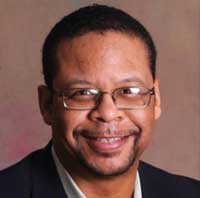 Good morning. I am blessed to have this opportunity to speak to you on a day that we honor Dr. Martin Luther King, his message and his legacy. I am grateful to Mr. Bernie Foster, the publisher of The Skanner newspaper, for leaving the back door open so I could sneak in here. I managed to get my family past security as well.
Good morning. I am blessed to have this opportunity to speak to you on a day that we honor Dr. Martin Luther King, his message and his legacy. I am grateful to Mr. Bernie Foster, the publisher of The Skanner newspaper, for leaving the back door open so I could sneak in here. I managed to get my family past security as well.
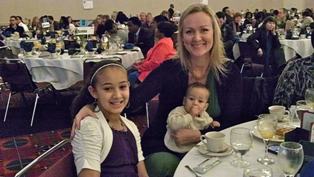
My beautiful wife Emily, my beautiful daughter Madison and my handsome son, Josiah, who might decide to compete with me for your attention at any moment.
I understand that I have 25 minutes to share with you 50 years of history.
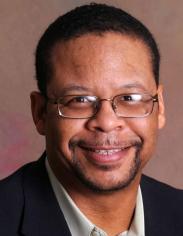 My guess is you all know most of the story anyway. What I plan to share with you is new information and data that you may have never heard before. I will juxtapose the era of the 60s with our present- day paradigm.
My guess is you all know most of the story anyway. What I plan to share with you is new information and data that you may have never heard before. I will juxtapose the era of the 60s with our present- day paradigm.
I will tell you a little bit about who I am and use Dr. Martin Luther King's historic speech to guide us through today's message.
My hope is you will walk out of this place more informed, more empowered, more energized and more determined to be an agent of change than when you arrived.
I'd like to begin where Dr. King left off ... with the solution to the problems of disparity in America.
Relationships
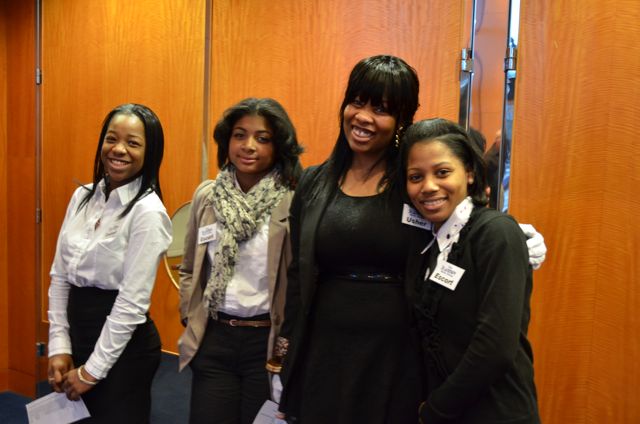 The 60s tend to be remembered differently, depending upon which America you grew up in. I know today some of us like to think there ought not be separate hyphenated Americans. I sure wish that was the sentiment of those in power in the 60s.
The 60s tend to be remembered differently, depending upon which America you grew up in. I know today some of us like to think there ought not be separate hyphenated Americans. I sure wish that was the sentiment of those in power in the 60s.
I grew up in Black America.
By the time I was in the first grade, Dr. King was assassinated, racial tension in the nation was at a fever pitch, and my mother, who was divorced, faced the reality of raising five children alone, in 1968 ... in the south. I should add that we were poor, in case there was any doubt.
No one in my sphere of family and friends were wealthy or had any history of wealth. 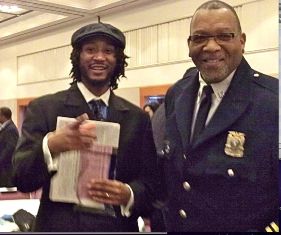 No one I knew understood the economic processes and trends in America. Everyone I knew was taught the same thing: You will have to work harder, be stronger, be smarter and more tolerant than your White counterparts just to stay even. The odds are stacked against your success in ways you cannot imagine. That was all true.
No one I knew understood the economic processes and trends in America. Everyone I knew was taught the same thing: You will have to work harder, be stronger, be smarter and more tolerant than your White counterparts just to stay even. The odds are stacked against your success in ways you cannot imagine. That was all true.
For some, it was a debilitating, demoralizing realization. For me, it was a challenge. I was a champion chess player, and in the top 5 percent of my class. But I had a lot to learn about the power of relationships and the America I didn't know.
When I graduated from Ross Sterling High School in 1980, alongside someone who you all might know, Clyde Drexler, I didn't have any White friends. There was one White student that I knew of at my school. I didn't know White America. I grew up in a Black cocoon on the poverty-ridden south side of Houston, Texas.
Thankfully, my mother understood the value of education far more than I did. She strictly enforced a standard of speaking what she called "proper English," in her home that made me a walking, talking target for violence in the streets. So I learned how to fight and I learned never to use Latin phrases like "prima facie" in casual conversation.
 During a couple of summers in high school, I was sent on the little yellow bus across town to a science and math institute at a private high school called Kinkaid. The campus looked like a college built within a forest. It was beautiful. But the biggest impression that sticks in my memory today was there were no locks on the lockers. I learned more in two summers at Kinkaid than I did in my entire time at Sterling High School.
During a couple of summers in high school, I was sent on the little yellow bus across town to a science and math institute at a private high school called Kinkaid. The campus looked like a college built within a forest. It was beautiful. But the biggest impression that sticks in my memory today was there were no locks on the lockers. I learned more in two summers at Kinkaid than I did in my entire time at Sterling High School.
What I did not learn was how valuable mentors and networks were. And I failed to establish either.
Dr. King understood the economic power in developing strong Relationships across racial boundaries.
When Dr. King shared his dream of little Black and White children in Alabama joining hands, and Black and White adults working together and praying together, I was just a one year old baby... and unemployed.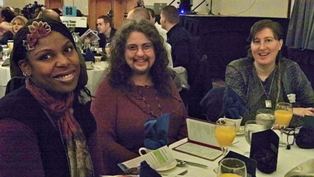
I didn't know it then, but the unemployment rate for Blacks in the 60s was twice the unemployment rate for Whites nationwide.
Today, we have a Black president, Barack Obama, who has become a symbol of significant change and hope in America. His very presence in the White House is a testament to the manner in which Blacks and Whites, among many others, have come together in a way that was unimaginable when Blacks and Whites gathered on the Washington Mall listening to Dr. King deliver his "dream" in 1963.
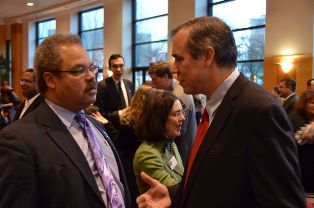 Of course, with the economy being of highest concern to most Americans, President Obama is a target of vitriol that permeates the nation.
Of course, with the economy being of highest concern to most Americans, President Obama is a target of vitriol that permeates the nation.
Today Black unemployment is near double that of White unemployment. If that sounds eerily familiar, it should. Black unemployment has been double or near double White unemployment every single year since President Barack Obama was in diapers and Dr. King was bemoaning the high jobless rate in the 60s.
That unchanged statistic offers insight into another:
On average, the wealth of White families in the 60s was 4 times that of Black families. Over time, the wealth gap has widened, with White wealth rising to 20 times that of Blacks today.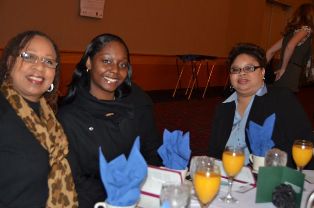
Soaring rates of Black unemployment in the 60s was a result of the vast majority of the private business sector refusing to establish business relationships with Black small business owners and a defiant refusal to hire Blacks into White-owned companies.
The standard pathway of helping Blacks was to donate to nonprofits that provided do-good social services rather than do business with Black business owners and support the rising tide of Black entrepreneurs. This was the arms-length approach.
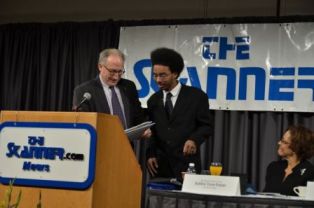 Today we see the economic consequence of decades of isolation and disconnect due to White businesses and majority corporations keeping Black businesses and entrepreneurs at arm's length. With few opportunities to connect to those in our society generating wealth, Black America has lagged in its ability to compete and thrive economically, and the wealth gap has widened.
Today we see the economic consequence of decades of isolation and disconnect due to White businesses and majority corporations keeping Black businesses and entrepreneurs at arm's length. With few opportunities to connect to those in our society generating wealth, Black America has lagged in its ability to compete and thrive economically, and the wealth gap has widened.
As President Obama has said, "it isn't class warfare, it's math."
We can easily calculate the damage of decades of disconnect.
Of the 1.9 million Black-owned businesses in America, 1.8 million are sole proprietors with no employees. None. Zero. That leaves roughly 100,000 Black businesses with an average of 9 employees according to the Bureau of Labor Statistics.
The total revenues generated by all 1.9 million Black- owned businesses are LESS than 1 percent GDP.
...And that data is from 2007, when Black entrepreneurship soared to its zenith. 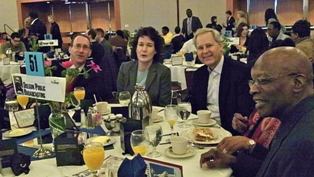
Think about this for a moment. Dr. King was killed on April 4, 1968 in a Memphis hotel just days before he was to join 1,300 striking sanitation workers subjected to working conditions so bad that two of them had been killed by a malfunctioning truck and hundreds were relying on welfare and food stamps because the wages paid by the city were so low they couldn't adequately care for their families. Four decades later, with Black entrepreneurship soaring and Black business owners seeking business relationships in the supply chains across industry sectors, the business productivity from all of Black
America couldn't reach 1 percent of GDP. That's after more than four decades of presumed progress. 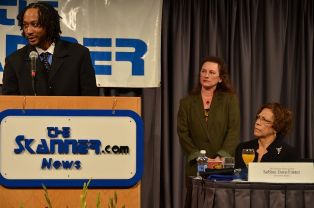
In the 60s, the government instituted policies to provide some economic opportunity for Black business contractors by carving out a tiny slothful slice of the overall dispensation of government contracts as a compliance measure to assist Black business owners and entrepreneurs. It was a major source of debate at the time and that debate still rages today.
The lack of inclusion and economic parity in the private sector, along with lack of access to capital, severely limited options for Black Americans to generate or create wealth five decades ago. The same problem exists today.
The government sector options, developed due to efforts by the heroic participants in the Civil Rights Movement, with Blacks and Whites working together, resulted primarily in greater employment opportunities. Diversity in the private sector was a significant problem then ... as it remains today.
There was no serious investment in developing high- growth entrepreneurs and wealth creating economic engines in Black America in the 60s. Incredibly, the same is true today.
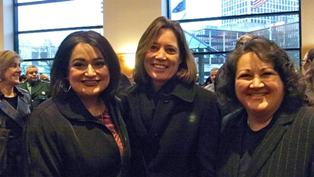 We know there was a pervasive pernicious pestilent sentiment in America's wealth-producing private sector in the 60s.
We know there was a pervasive pernicious pestilent sentiment in America's wealth-producing private sector in the 60s.
So what's going on in the private sector today?
In 1969, Rockefeller's first venture capital company, Venrock, invested in a little company called Intel. Since then, the venture capital industry has ballooned to more than 500 VC groups nationwide with a National Venture Capital Association trade group that meets annually. Last year the NVCA met in Boston alongside the Angel Capital Association, which has nearly 200 member groups.
Angel investing has become popular over the past 30 years and serves as a bridge for bootstrapping entrepreneurs to reach milestones that attract venture capital to grow exponentially and create more jobs. 
This entire industry of risk capital investment was established, nurtured and grown over the past five decades into a private sector economic engine that fuels job growth and creates wealth in White America. As it targeted regions and businesses around the nation, it somehow managed to miss most all of the Black and Hispanic urban communities in the nation.
This targeted investment and lack of inclusive relationships has resulted in today's "islands of poverty surrounded by oceans of material wealth," as Dr. King described the same situation in 1963.
 Of course, Black America has much work to do. Despite the difficulties of the past, the question before us is: What are we doing today to overcome the deep-seated historical challenges? Dr. King and other heroes rose to the occasion in the 20th century. And Americans of all races joined the Movement. In this 21st century, who will lead the much-needed economic movement? And who will join the process?
Of course, Black America has much work to do. Despite the difficulties of the past, the question before us is: What are we doing today to overcome the deep-seated historical challenges? Dr. King and other heroes rose to the occasion in the 20th century. And Americans of all races joined the Movement. In this 21st century, who will lead the much-needed economic movement? And who will join the process?
The value in uplifting disconnected sectors of society is exemplified by the meteoric rise of Asian American businesses and entrepreneurship. With a willingness to invest in themselves, focus on STEM education and support talented technology innovators and startup entrepreneurs in their midst, Asian Americans have provided us with a working model of fast-paced economic development.
According to a San Jose Mercury News report quoting the Commerce Secretary in 2011, Asian-American owned businesses account for half of all minority business employment in the nation. That's a lot of employment of the non-government minority working sector from a very small racial demographic group.
As it turns out, Asian-Americans own nearly as many businesses as Black Americans, but produce 17 percent of GDP compared to less than 1 percent.
 There are valuable lessons in the economic progress of other minority groups. The willingness to invest in themselves is key.
There are valuable lessons in the economic progress of other minority groups. The willingness to invest in themselves is key.
Of course, in the investment realm of angels and venture capital, it's all about relationships.
As the nation transitioned from a manufacturing economy that was 20 percent of the overall job market in the 60s, to a single digit percent of the job market today, very little investment was made in Black America to educate, train and prepare a needed workforce to fully engage in a knowledge- based tech-driven global innovation economy.
Sadly, a prominent elected official seeking to be president of the United States recently said that he believed the best way to help Blacks earn income was to bring back manufacturing jobs. Such ill- informed statements from powerful representatives of the people demonstrate an ongoing disconnect. A couple of immediate points come to mind:
1. When manufacturing was a significant percentage of the share of jobs in America's economic engine, Blacks still had double the unemployment rate of Whites. I have no idea how turning back the clock would solve the unemployment problem.
2. America invested heavily in a knowledge-based, tech-driven innovation economy over the past 40+ years. From the pipeline of education to the productivity of high-growth entrepreneurs, hundreds of billions of dollars have flowed each year into short-term and long-term investments in people and communities. The fact that America failed to make those investments in Black American children and poor communities is unfortunate. The fact that many prominent elected officials today still fail to recognize such a need ... is telling. 
Today Blacks are severely underrepresented in STEM professions (science, technology, engineering and math). Black entrepreneurs and businesses are under-resourced and under-capitalized. And Blacks are less than 1 percent represented in the risk capital investment sector. In fact, there's only one nationally recognized Black angel group that belongs to the Angel Capital Association.
Even venture capitalists, who have the privilege of investing the nation's pension funds that contain the retirement contributions of working Black Americans, are prone to say they have no relationships with Black entrepreneurs or CEOs. 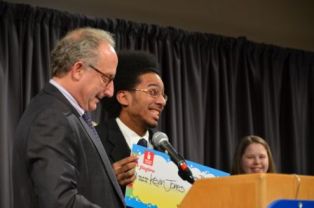
It isn't surprising that Michael Arrington, the founder of the media property Techcrunch and a Silicon Valley investor, would tell CNN in the summer of 2011 that he doesn't know a single Black entrepreneur or CEO. The reality is he actually does. But his on-camera statement offers insight into the level and quality of those relationships. 
That same statement has been said in one way or another by thousands of business leaders, corporate CEOs and investors.
In the media landscape, the ill-informed notion that there are no qualified minority candidates for jobs is pervasive among majority media owners, publishers and editors. Only 2 percent of the television broadcast market is owned by all the minority groups in the space combined, although minorities now comprise 36 percent of the nation's population. 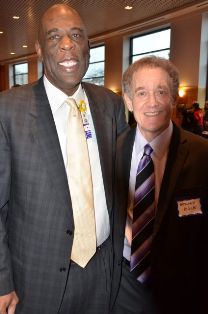
Even the FCC can't seem to garner enough interest to properly study the problem. It has a legal mandate to publish a report on minority media ownership periodically. More than once, it has offered elementary excuses why it has failed to comply with the legal mandate from the Third Circuit Court. When pushed, it finally issued a report in late 2011 that essentially stated it could not conclude anything for lack of data and it would need to conduct a study.
The last data collected in 2009 offered a snapshot of how far the media industry, which is one of the most powerful industries of influence in the nation, has progressed since the Civil Rights Movement seared the conscience of America.
In 2009, there were 1,394 full power commercial television broadcast stations in the nation. 29 of those were minority owned. Of those, only 9 had Black owners. That's 0.6 percent market share. 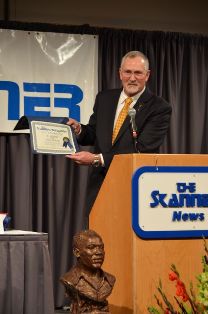
Moreover, the FCC report made this statement about the value of diversity among media consumers. That's you and me:
That's a stark revelation from the FCC, which holds up a mirror of media consumer attitudes and tastes, that suggest a disconnect with, perhaps even a disregard for, the multicultural diversity of the nation. 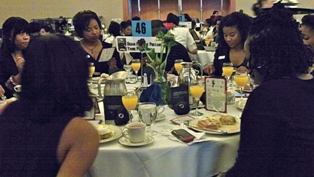
"Media Ownership Study 2 concludes that consumers value diversity of opinion and community news to varying degrees that generally increase with age, education, and income. The study also examined the value listeners place on multiculturalism, however, which was found to decrease with age. The study further concludes that:
White male consumers generally do not value multiculturalism."
That's not 1960. That's in 2011. To the ears of many older Black Americans, this is the same song that's been playing for a half- century. 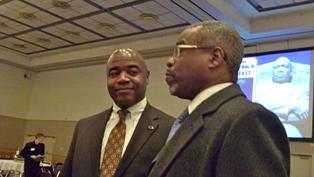
If there's little value in cross-cultural relationships expressed by White males, according to the 2011 FCC report, what does that say about the difficulties encountered by those in the Diversity & Inclusion industry working hard to persuade White male business leaders of the value of diversity?
The problem presented by such lack of relationships is summed up by a Kauffman Foundation report on job growth and entrepreneurship in America. It states that nearly all net new job growth in the nation since 1980 is the result of companies five years old and younger. That points directly to startups and early stage high growth companies fueled by angel and venture capital. 
So let's sum it up:
If nearly all net new job growth in the nation is produced by mostly White-owned young companies fueled by risk capital from mostly White investors, and most of these people can honestly say they don't know many, if any, Black entrepreneurs or investors, then the 1 percent Black productivity and Depression Era high unemployment will continue to be a problem until we fundamentally "change the equation."
This calls for a new approach for us to work together to change the current scenario. This calls for a new set of relationships to be established between Black and White America, one that is built upon mutual interest, concern and opportunity.
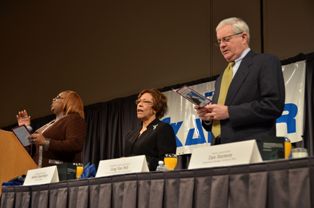 And that brings us right back to where we started in the 1960s. Back then we had a problem with more than just business relationships. It was illegal for Americans to cross the lines of race in their own personal relationships. I would not have been allowed to marry my wife in the era in which Dr. Martin Luther King lived.
And that brings us right back to where we started in the 1960s. Back then we had a problem with more than just business relationships. It was illegal for Americans to cross the lines of race in their own personal relationships. I would not have been allowed to marry my wife in the era in which Dr. Martin Luther King lived.
At the time, laws across the nation prohibited Blacks and Whites from marrying. The Supreme Court changed that in 1967 with a unanimous ruling.
Alabama was the last state to finally overturn its ban on interracial marriages. That was in the year 2000. Still, 40 percent of the electorate voted in favor of maintaining the unenforced legal ban. The resistance to the symbolic removal of the law revealed deep- seated disapproval of the relationships between Blacks and Whites. That was just a little more than a decade ago.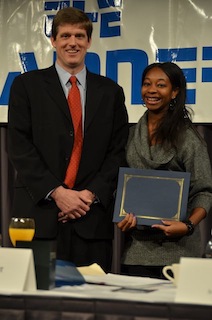
 So, ladies and gentlemen, I have filled your ears with a lot of troublesome information, history and factual data. But it is essential that we recognize what Dr. King deeply understood – that relationships help to define the problem and challenges we face, and that the solution lies within building stronger relationships.
So, ladies and gentlemen, I have filled your ears with a lot of troublesome information, history and factual data. But it is essential that we recognize what Dr. King deeply understood – that relationships help to define the problem and challenges we face, and that the solution lies within building stronger relationships.
Dr. King envisioned a time when America would invest in Americans of all races. When all races would be empowered to work together to create a strong nation that is not only economically strong, but also strong in its character, exemplified in the dignity it extended to all its citizens.
During my 12 years as a navy engineer, I saw the value of investing in relationships and treating others with dignity and respect regardless of rank. It paid off with numerous awards.
During my 14 years in media as a newsroom leader, I saw the value of investing in relationships, mentoring professional journalists and producing a community youth journalism workshop to educate, empower and inspire youth in the art of storytelling. 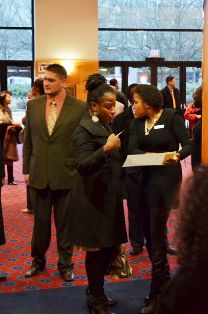
So what am I doing about the monumental problems I laid out today?
Since I began writing about the issues of disparity and underrepresentation of Blacks in tech entrepreneurship and risk capital investing in the Huffington Post in the summer of 2010, I've invested in developing relationships with two extraordinary men who have worked on opposite ends of the spectrum of economic development.
Dr. Chad Womack is a biotech entrepreneur and scientist in Philadelphia who worked at NIH on AIDS research in the 80s. He is a graduate of Dr. King's alma mater, Morehouse College twice over, earning a Ph.D. in Biomedical Science. He has worked tirelessly to promote STEM education and develop revolutionary learning techniques while establishing national minority STEM professional associations. Dr. Womack is connected directly to the White House and is a science advisor to the Economist magazine. Dr. Womack is working to transform K-12 and higher education processes to work together seamlessly with industry to increase the flow in the workforce pipeline.
Johnathan Holifield is a visionary economic development expert. He is a former attorney, former president of the Cleveland Urban League and a former NFL runningback for the Cincinnati Bengals. But not in that order.
For more than a decade, Johnathan has been talking about the new economy, which is now known as the Innovation Economy. He led a 100-day community initiative, with more than 300 volunteers that launched CincyTechUSA, comprised of university presidents, Fortune 500 CEOs, innovation entrepreneurs and technology advocates. CincyTechUSA has been dubbed the "Regional Voice of Technology and Innovation" in Ohio. 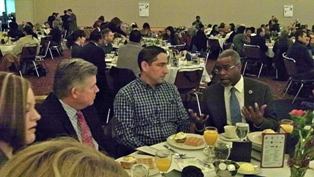
Johnathan has also served as co-chair for a committee of the Midwest Governors Association Investments for the Knowledge-based Economy Project. He also received a gubernatorial appointment to the Ohio House and Senate Joint Legislative Commission on High-Tech Business.
These two men and I decided to invest our lives into changing the economic narrative in Black and urban America to adopt and infuse a 21st century economic paradigm that connects the economically disconnected sectors of urban America with the established economic engines driving the Innovation Economy within the same adjacent regions. 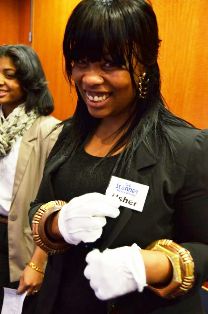
We established The America21 Project as a national platform from which we would combine the strength of our experiences in STEM education, innovation and economic development, and mass communications to initiate a 21st century economic movement across urban America that would result in job growth and wealth creation.
Our goal is to initiate exponential economic impact in cities and urban communities across the nation.
Our strategy is to tell the story of the Innovation Economy, its challenges and opportunities, in a manner that's easy to understand, using three core pillars:
ï‚· STEM education & workforce development
ï‚· Entrepreneurship, especially high-growth entrepreneurship
ï‚· Access to Capital & Capital Formation
Our approach is to follow the solution provided by Dr. Martin Luther King. We seek to connect the disconnected and develop strong relationships across the racial and economic divide.
Understanding that relationships are the foundation upon which investments of time, effort and money are made, The America21 Project brings together investors with entrepreneurs, university leaders with K-12 educators, community leaders with government leaders, CEOs with small business owners and the list goes on. Through The America21 Project, those who cry out for help from islands of poverty can be heard by those sailing in the oceans of material wealth. Working together, we can achieve Dr. King's dream.
So, what have we achieved thus far?
In less than one year, The America21 Project has brought together leaders from across the economic and political spectrum in Philadelphia who are currently working on an Urban Innovation Roundtable.
We partnered with the University of Portland to bring together leaders in this city to discuss the challenges and opportunities in the Portland region. 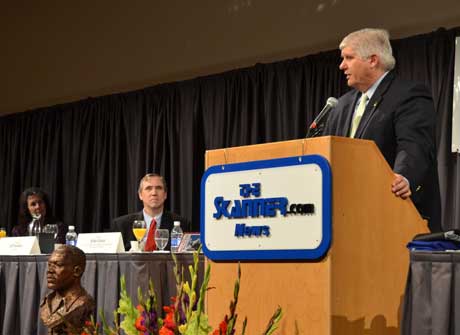 During that catalytic gathering in November 2011, I introduced the opportunity for Portland to be the
During that catalytic gathering in November 2011, I introduced the opportunity for Portland to be the
first city in the nation to produce an Urban Innovation Roundtable, bringing together leaders from the established economic ecosystem working with leaders from the economically disconnected sectors to incorporate the strategies developed by the America21 Project to generate exponential economic impact in the region. That idea was met with enthusiastic response. In just a moment, I'll make an announcement regarding the progress of the Portland UIR.
Last year, The America21 Project also produced a major panel session on Finding Startup Capital for minority media entrepreneurs. We partnered with Unity, Journalists of Color and the organizers of New U, to help develop the first-ever entrepreneur mentoring workshop for minority media entrepreneurs.
We partnered with CNN to produce screenings of its latest documentary, Black in America: New Promised Land, Silicon Valley. We produced screenings in four major cities including Portland. 
We also partnered with the Center for Urban Entrepreneurship & Economic Development in Newark, NJ and produced the first-ever Gathering of Angels Summit, bringing together minority tech entrepreneurs and minority investors for the first time.
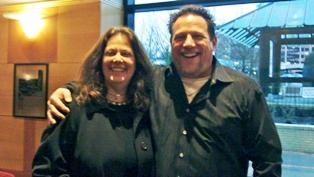 As a result of a pitch competition we produced for the summit, eight of the 13 entrepreneurs were immediately approached by investors ranging from Goldman Sachs to a Silicon Valley legendary investor.
As a result of a pitch competition we produced for the summit, eight of the 13 entrepreneurs were immediately approached by investors ranging from Goldman Sachs to a Silicon Valley legendary investor.
One of those companies is led by Andres Montgomery, a former Microsoft employee who is the CEO of Dreem Digital, an award-winning small tech company in Salem, Oregon.
Additionally, the Center for Urban Entrepreneurship & Economic Development, located at Rutgers Business School, is now developing a National Urban Innovation Fund as a direct outcome of the "Gathering of Angels."
This year, The America21 Project has partnered with the biomedical industry in Cleveland to produce the first-ever Minority Biomedical Entrepreneurship Conference on May 21-22, 2012. 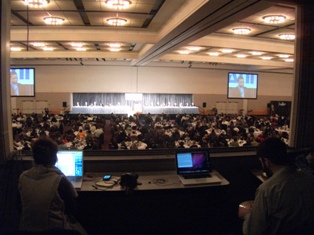
We are gearing up again for more work with national media and minority media entrepreneurs.
We are partnering with Open Government TV to establish a platform that capitalizes upon the federal government's directive of openness and transparency to highlight our federal government's vital role in revitalizing our cities and urban communities through innovation.
These efforts by The America21 Project have been funded by the blood, sweat and tears of three committed men. We didn't wait for others to invest in us. Instead, we invested in ourselves. We dream of serving the needs of others nationwide to help achieve the dream of Dr. Martin Luther King, whom we honor today.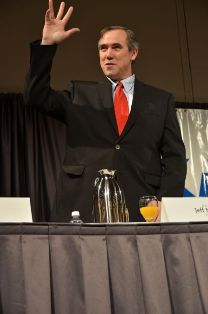
Here in Portland, Oregon, we were fortunate enough to have the support of concerned leaders at the University of Portland sponsor the event we held on their campus in November.
We were blessed by the Mitchell Kapor Foundation in San Francisco, which, along with the Electronic
Knowledge Interchange in Chicago, helped sponsor the Gathering of Angels at Rutgers Business School.
But we didn't sit and wait for funding. We acted with a sense of urgency. We acted because we understand what's at stake for the future of our children and your children.
As Dr. King stated, our futures are "inextricably" tied. "We cannot walk alone." We cannot. And neither can America continue to ignore investing in the cultivation of its disconnected business sectors and urban youth.
I recognize by the evidence of your presence here today, that each and every one of you has similar concerns to my own. I believe you want to engage in forging and furthering relationships that will bring about real economic change in our community. I believe that.
And because I believe it, I've already started recruiting an exploratory committee to help establish a new economic approach to expand and increase the economic strength of our region. It's called the Portland Urban Innovation Roundtable.

The Portland UIR needs committed leaders across the spectrum of the established economic ecosystem and those from the economically disconnected sectors to work together and with The America21 Project to create a culture of urban innovation that produces exponential economic impact in disconnected communities across Portland.
I'm excited to announce the University of Portland has accepted an invitation to participate on the Urban Innovation Roundtable. I have been blessed to have the Urban Entrepreneur Network and Mr. James Posey help me move the ball forward with the UIR.
In fact, it was James who reached out to me after a commentary I wrote was published in the Oregonian last year. James re-focused my national attention right here in Portland. Through James, I met Bernie.
I am most appreciative of the leadership and generosity of my friend Bernie and his wonderful wife Bobbie.
Bernie has already moved the ball forward by offering me this stage upon which to extend an opportunity to Portland leaders to cross the chasms of communication and racial fault lines to work together to make Portland the best it can be. 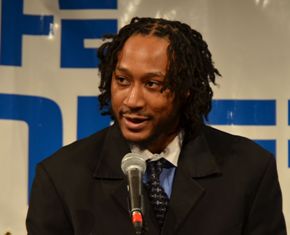
The Skanner newspaper is a venerable institution of information, influence and impact in Portland. With the support of The Skanner, Portland's economic leaders can work together to establish a unique relationship as leaders on the Urban Innovation Roundtable. 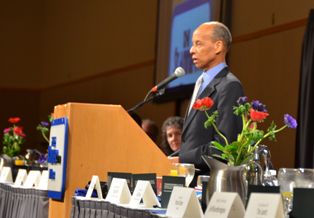
This effort will need more than people offering an energetic applause or backseat support. It will need leadership. It will need investment. It will need seed funding. It will need commitment. And in honor of the legacy of Dr. Martin Luther King, we ought not leave without recognizing the urgency of now!
The question I have for you today is: Are you ready to work together?
The America21 Project is ready to stand with you in building strong communities and connecting the disconnected to a vibrant Portland innovation ecosystem. If you're willing to commit to working together then let me see you stand together.
Thank you Portland. Thank you for taking a stand. Thank you for committing to the Dream. I look forward to working with you all and helping develop an inclusive urban innovation ecosystem that cities around the nation will adopt.
Read Bernie Foster's speech here

















































































































































































































































































































































